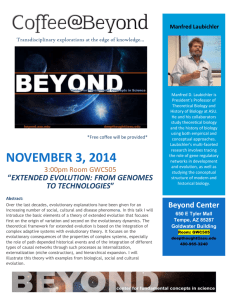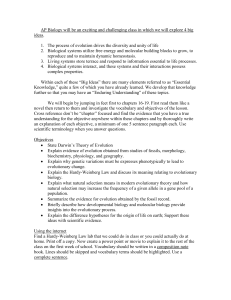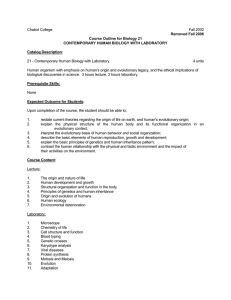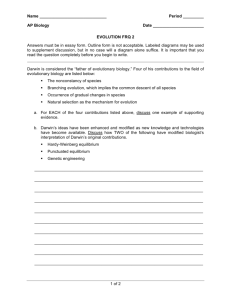Student Learning Outcomes for the three baccalaureate programs in Biology B.S./B.A. Biology 1. Awareness of the diversity of life, the evolutionary processes which result
advertisement
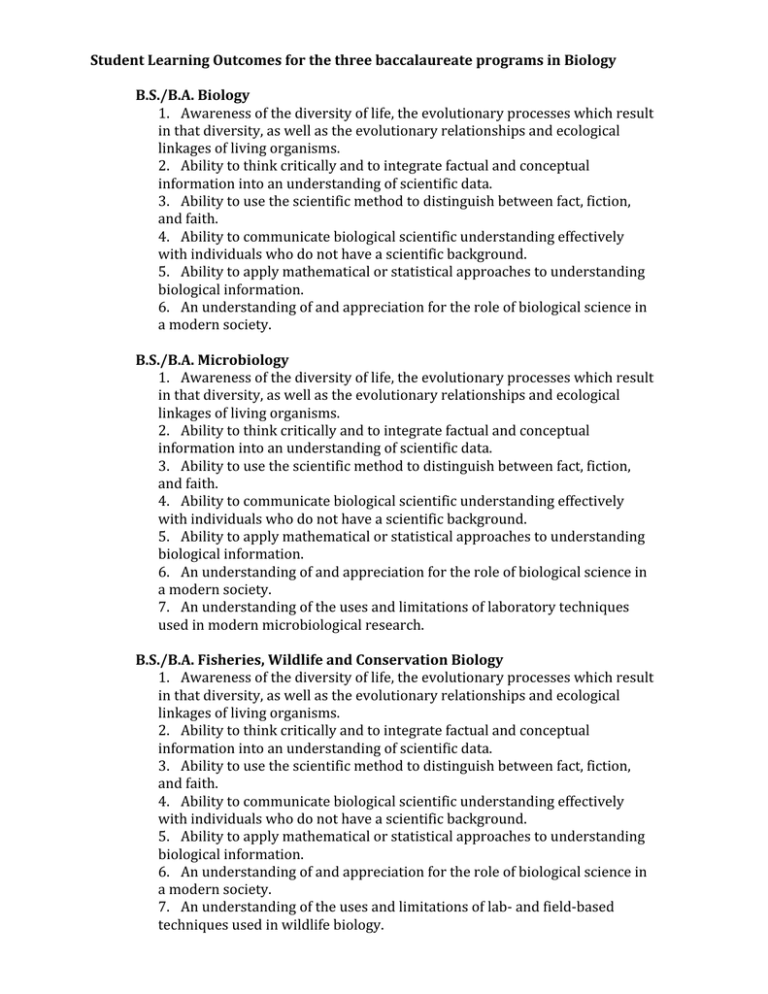
Student Learning Outcomes for the three baccalaureate programs in Biology B.S./B.A. Biology 1. Awareness of the diversity of life, the evolutionary processes which result in that diversity, as well as the evolutionary relationships and ecological linkages of living organisms. 2. Ability to think critically and to integrate factual and conceptual information into an understanding of scientific data. 3. Ability to use the scientific method to distinguish between fact, fiction, and faith. 4. Ability to communicate biological scientific understanding effectively with individuals who do not have a scientific background. 5. Ability to apply mathematical or statistical approaches to understanding biological information. 6. An understanding of and appreciation for the role of biological science in a modern society. B.S./B.A. Microbiology 1. Awareness of the diversity of life, the evolutionary processes which result in that diversity, as well as the evolutionary relationships and ecological linkages of living organisms. 2. Ability to think critically and to integrate factual and conceptual information into an understanding of scientific data. 3. Ability to use the scientific method to distinguish between fact, fiction, and faith. 4. Ability to communicate biological scientific understanding effectively with individuals who do not have a scientific background. 5. Ability to apply mathematical or statistical approaches to understanding biological information. 6. An understanding of and appreciation for the role of biological science in a modern society. 7. An understanding of the uses and limitations of laboratory techniques used in modern microbiological research. B.S./B.A. Fisheries, Wildlife and Conservation Biology 1. Awareness of the diversity of life, the evolutionary processes which result in that diversity, as well as the evolutionary relationships and ecological linkages of living organisms. 2. Ability to think critically and to integrate factual and conceptual information into an understanding of scientific data. 3. Ability to use the scientific method to distinguish between fact, fiction, and faith. 4. Ability to communicate biological scientific understanding effectively with individuals who do not have a scientific background. 5. Ability to apply mathematical or statistical approaches to understanding biological information. 6. An understanding of and appreciation for the role of biological science in a modern society. 7. An understanding of the uses and limitations of lab‐ and field‐based techniques used in wildlife biology. Student Learning Outcomes for the three graduate programs in Biology M.S. Biology 1. Ability to design experiments with appropriate controls, and to conduct original research in a biological discipline. 2. A thorough understanding and/or competency in a specific area of biological science. 3. The ability to apply knowledge through critical thinking, inquiry, analysis, and communication to solve problems and to produce original research in the form of a master’s thesis or doctoral dissertation. Ph. D. Biology 1. Ability to design experiments with appropriate controls, and to conduct original research in a biological discipline. 2. A thorough understanding and/or competency in a specific area of biological science. 3. The ability to apply knowledge through critical thinking, inquiry, analysis, and communication to solve problems and to produce original research in the form of a master’s thesis or doctoral dissertation. Ph. D. Microbiology 1. Ability to design experiments with appropriate controls, and to conduct original research in a biological discipline. 2. A thorough understanding and/or competency in a specific area of biological science. 3. The ability to apply knowledge through critical thinking, inquiry, analysis, and communication to solve problems and to produce original research in the form of a master’s thesis or doctoral dissertation.

